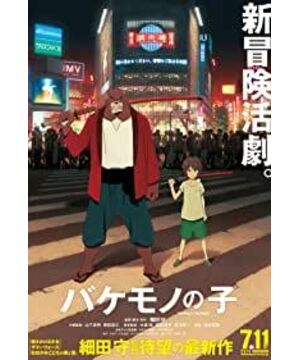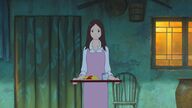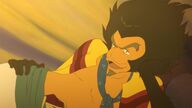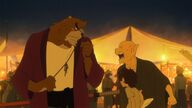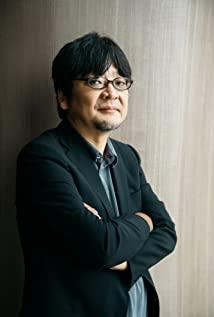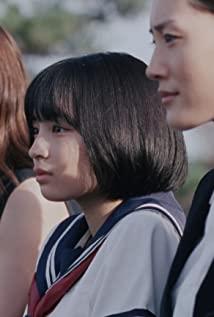—— ——A comprehensive investigation of the application of fictional space in the three works of Mamoru Hosoda, Rain and Snow, Children of the Wolf, Son of the Monster, and The Future of the Future.
When Rain walks into that mysterious nature, we know he won't come back.
The ending of "Wolf's Children Rain and Snow" is suspended, and there is no answer to why Rain left the family and returned to nature. We can understand it as the wolf's child's instinct is lured by the mysterious nature of nature, and when he finds himself out of tune with society, returning to the natural ending is inevitable. As a contrast, our eyes were able to re-examine the other protagonist of "Wolf", Snow. She, too, was once banished to the fringes of society, but was left in the family by some kind of miracle: the kinship of the family and the love of a boy and a girl. So "Wolf" completes the re-exploration of family and society through the opposition of two character choices. Taking into account Hosoda Mori's special concern for the family, "Wolf" obviously achieved this goal.
But we can still keep talking about rain. There is a lot of criticism of rain in the barrage, which shows that there is room for the movie to discuss rain. In "Wolf Children Rain and Snow", there is an obvious opposition between human society and nature. Society and family have been successfully explored, but what about nature? What exactly is this "natural"? How did a wolf father who was completely born from nature and had no contact with human society enter human society? And the rain in the birth and human society can no longer truly return to nature. When Yu communicated with his master fox, the mysterious nature also began to show an appearance that was inconsistent with itself. More ironically, why is the more restrained rain returning to nature, not snow. It is not the wildness in the blood that the rain returns to nature, and it is not the wild and disorderly nature that he goes to. The too secretive nature in "Wolf" needs to be unfolded urgently. People need to know where the rain is going, and they need him to come back and tell people about the camera again. Mamoru Hosoda, who is obsessed with the theme of "Going Home", needs to bring the rain back.
The question then shifts to how to heal the wounds of those who are excluded in the family and society, in order to explore the possibility of a better person and family. In "Monster's Son", Mamoru Hosoda radically rewrote the nature in "Wolf", from the ideal opposite of human society to the fictional space of idealized pre-modern society within human society. Create an ideal family to carry out the healing mission. In "Future of the Future", a surreal time series is constructed by directly tracing back the history of the family to complete the re-exploration of the family. The former focuses on space, the latter on time.
Most importantly, the fictional space that is pre-placed into the text
Rain is naturally unsuitable for human society, so that there is no need to describe in detail how he looks out of the crowd. Jiutai suffered some kind of more intense trauma, the death of her mother, the departure of her father, and the disintegration of her old family. He immediately resisted starting a new family because that would acknowledge his mother's departure and other relatives wouldn't listen to him. Rather than being driven out by society, it was more like escaping from a certain inevitability. So Jiu Tai chose a place of self-exile and finished leaving home. This contradiction is almost too simple, not even as serious as in "Wolf", and the appearance of the mother several times did not even touch Jiutai's trauma. Looking at the textual structure of the entire film, what really matters is where Jiutai left home, but where he was before and why he left is not important. Tianshi Street was pre-existing in the movie. Before the role of Jiutai appeared, he was doomed to lose his parents and go to Tianshi Street. In contrast, the memory time and space of the family, which "Future of the Future" focuses on depicting, is completely indistinguishable from the reality in the story. The emotions and growth that children get from that time and space are immediately connected to reality. In "The Future of the Future", the individual's departure from home is no longer needed, and Xiaojun's behavior of trying to run away from home when he grows up has been denied from the beginning. (I think this scene is what "Future of the Future" is really trying to face, just to completely eliminate the possibility of him leaving home, the whole film retroactively starts from his childhood, and radically replaces its main content. )
Then what is the space of "Children of Monsters"? With Jiutai's initial exploration of the monster world. People found that the inner world full of monsters in "Children of Monsters" is not something completely different from human society. The monsters living in "Tianshi Street" are obviously a group with etiquette and rules, and their society is also due to one. There is an inner order and order, everyone has a sword, but the sword cannot be drawn. The contradiction between the admiration of primitive brute force and its limitation highlights the rational order of this society. They are hardly bothered by superfluous things, living only work and play, and have no desire to control others. In fact, this space cannot exist outside human society, but can only be a fictional place within human society. Therefore, the mysterious space of nature that is opposed to human society in "Wolf" has become a pre-modern society that highly idealizes human society. It is not outside of human society, but a possibility within society. In "Future of the Future", the space in the society is further placed inside the family. With the time and space exploration of family memory, the reconstruction of the family is directly completed.
The mission of space, the reconstruction of the family
So how does the space function as a place for family restructuring? The same must be examined in the intertextual relationship between Wolf and Son of the Monster. The difference in the role of space in the two works is determined by the attitude of Yu and Jiutai when they enter the space.
Compared with the more lively snow, the more restrained and contemplative rain chooses to go into nature. On the one hand, it shows that the mysterious space of nature is by no means barbaric and disorderly, and on the other hand, it is to maintain the mysterious properties of natural space, so that it can be paralleled with human society without appearing to be inconsistent. Although Yu left the family out of the conflict between his nature and human society, his decision to leave the family was also carefully considered. Even if its essence is not unfolded, it is nevertheless complete enough. It is believed that he made the right choice instead of heading for tragedy. Thus the mystery of nature is preserved, and the structure of the film no longer requires it to reveal itself too much, but only as the possible antithesis of human society. In contrast, Jiutai is an irrational person. He chose to leave home because of the impulse given by his own trauma, and it is impossible for him to take on this responsibility. Therefore, the film must require the new surreal space (Tianshijie) to undertake the heavy responsibility of healing the trauma and making it grow. But as mentioned above, Jiu Tai's trauma is simplified, and here, healing the trauma has instead become an excuse for his treatment, that is, rebuilding the family. The creation of a new family itself is more important than why it was created.
So we see that the emotional changes of Jiutai's integration into this world and the new family have been simplified again: a person exiled from the real world is caught in the predicament of a double stranger in the monster world. But this monster world is extremely inclusive. Even if it says that it rejects human beings, it still tolerantly keeps it in Tianshi Street. Master Rabbit's reconciliation of this contradiction is out of the will of the movie. And Jiu Tai, after escaping from establishing a new family in the human world, also resisted forming a family with monsters out of inertia. But after a straightforward confrontation - Xiong Che was moved by the pig king mountain, he took the initiative to integrate into this new family. The audience should be able to explain from it that Jiutai is eager to be noticed by people (Xiong Che), eager to take care of a poor person (Xiong Che), eager to discover the value of himself (fight), and eager to survive in this new world. But the foreshadowing and narration of this emotion is still insufficient, and something more important is attracting the attention of the film director. Hosoda Mamoru couldn't be satisfied with letting Jiuta stay in the new family in this fantasy world. He needed to let Jiuta perfect himself in the monster world and return to the human world and the old family. Therefore, we can see that the new family formed by Xiong Che and Jiutai has gaps from the beginning, and it is inevitable for Jiutai to return to human society. The greatest artistic value of "Son of the Monster" also appears at the magical moment when the two worlds meet again. Jiutai returns to human society and shuttles back and forth between the two worlds.
The intersection of two worlds, a re-exploration of modern human cities and societies
The family established by Xiong Che and Jiutai was not strong from the beginning. Xiong Che is also a broken and traumatized person, and he has almost no desire to control the existence of Jiu Tai. After Jiutai's strength increased and his wounds began to heal, Xiong Che also benefited from the relationship between the two. It is in this kind of relationship that has no coercive power at all and can be destroyed almost at any time. It's like an egg, and the movie is waiting to smash it and allow Jiutai to return to human society freely.
So, when Jiu Tai accidentally found the way back to the world, the huge power of the movie began to condense. I'd even like to call this the real opening of the movie.
Jiutai has a dual identity here, a person born in human society and a person who grew up in a monster world. The former destined him to return to modern society, while the latter gave him a more special perspective to examine modern society. He is no longer a double stranger, but a free man accepted by both worlds. It is this dual identity that gives him great possibilities. The moment he walks into the real world, he has the power to decide his own destiny, that is, to stay in the monster world, or return to the human world, or keep both. identity. At this time, the two worlds open themselves to Jiutai and the audience. In "Wolf", the nature where the rain goes is closed and exclusive in a sense, but rain and snow also retain the right to decide freely. In "Future of the Future", Xiaojun, as a young child, does not control his own power, but can only completely obey the direction of the film's narrative. This is due to the different narrative strategies of the three films.
The "Son of the Monsters" movie itself is also in the collision of the two worlds, and has also gained huge possibilities. The lens no longer has to be trapped in Tianshi Street, it has gained a wider field of vision. It can be said that the movie has more freedom than Jiutai. Audiences who are accustomed to Tianshi Street will inevitably feel the impact of the collision between the two worlds. Buildings, billboards, airplane libraries, and girls make audiences accustomed to Tianshi Street feel unfamiliar with modern civilization. This strangeness makes it possible to re-explore our familiar city, and the executor of the exploration is Jiutai with dual identities.
After a few shots of the plane in the crowded city, there is a shot of a page. Jiutai came to the library first. Compared with the scenes of many modern cities he had seen before, knowledge was the first to attract him. Perhaps the film here believes that the library is a symbol of the charm of modern society, and knowledge is one of the dimensions that distinguish the real world from the monster world. The thirst for knowledge displayed by Jiutai contrasts with the utilitarian desire of modern people. This is Jiutai, the embodiment of the purity created by this monster world. Along with the desire for knowledge, the girl's relationship with Jiutai was approached and led him to university. For this goal, Jiutai found his father again and restored his family in the real world. The movie uses girls and blood relations, the elements that Hosoda Mori loves to keep Jiuta in the real world. He can't leave again, and the only problem is his relationship with Tianshijie. Does the movie want him to leave that fantasy world, and how?
Disappearing Tianshi Street, the inner dimension of society and people
Although Jiutai can move freely between the two worlds and the two families, the movie does not seem to allow him to make such a choice. We can understand it as the monster world of Tianshijie is only the power of fantasy given to you before you grow up, and it will be completely closed to you when you grow up and get redemption. The contradiction between the two worlds rapidly heated up, and Jiu Tai felt that it was difficult to choose between Xiong Che and his father. Being accepted by both worlds at the same time caused confusion about his identity, and he once again became a double stranger. So Jiu Tai saw a huge void in his own heart.
What is this void?
In "Monster's Son", the essential difference between humans and monsters is described as a huge void in the heart. This is actually an element that is vaguely dealt with by the film, considering the pre-modernity of the monster world, the emptiness is the traumatic essence of modernity living in the hearts of modern people. Considering that only Kuta and Ichirohiko burst out with emptiness, and these two people spent most of their lives in the world of monsters, we can interpret it as the confusion of aliens who are lost in the world of monsters about their own identity. As a fictional fantasy world, the confusion of people lost in it challenges its legitimacy fatally. Once the void erupts, it is waiting to be filled, and when the void is filled, Jiutai will eventually lose her dual identity, and there is no need for Tianshi Street to exist.
So the movie pushes the conflict between the monster world and the real world to the extreme, letting the former retire in the fiercest collision between the two. Xiong Che was penetrated by the sword, Ichiro Yan fled into the human world, Jiutai followed him, and the huge power of the monster world impacted the order of the human world. News broadcasts on TV suggest that this was the time when the Nikkei was at its peak before the bubble economy burst. In the most glorious moment of modern society, Ichirohiko and his terrifying whale shadow can be seen as the hidden crisis in this society. (Given that the release time of "Son of the Monsters" is so far from the bubble era, it is best not to explain too much.) This is when the two worlds in the movie are most closely related, and it can be considered that the monster world is the inner possibility of the real world. sex. The invasion of the monster world into the real world order also pushes the tension between the two to the extreme and completes the task of exploring modern society. With Ichirohiko's attack, the crowds and lights of the city at night are better depicted.
In the end, Xiong Che chose to turn into a sword, filling the hole in Jiuta's heart and helping him defeat Ichirohiko. This means the loss of Jiu Tai's dual identity. The family he established with Xiong Che disappeared completely with the disappearance of Xiong Che, or was internalized into his heart. And his relationship with Tianshijie is about to break. The demise of the monster world and the new family means that Jiutai has been rescued and completed his self-shaping. He can better survive in the modern world and return to the old family. Tenshijie is not the outside of Shibuya, but a part of its interior. And the new family of Tianshijie and Xiong Che are by no means external to Jiu Tai, but something he has in his heart. Therefore, the entire movie as Jiutai's journey of salvation did not take place in the outside world, but only within the city, and the expansion of Jiutai's inner dimension.
Children of the Monsters is a flawed animated film that tries to say too much, but two hours is simply not enough to get it done. It opened up the dimension in Jiutai's heart, but only left a void, and only filled it with the abstract sacrifices of Xiong Che and Tianshijie. The shaping of the two worlds almost occupies the vast majority of the narrative resources of the film, while the shaping of characters and families and the foreshadowing of emotions are insufficient. This is in contrast to "Wolf Children Rain and Snow", which prioritizes emotional narratives about the structure of the family itself, and hides it from the world. The natural world can be mysterious, and the heart of a contemplative and introverted rain can be hidden. Therefore, "Children of the Wolf" is more perfect in terms of artistic value. On the other hand, "Future of the Future" directly places fantasy time and space in the history of the family. The exploration of time and space is itself an exploration of family emotions, and there is no danger of separation and bias. From this point of view, "Future of the Future" is a perfection of the internal logic of "Son of the Monster".
View more about The Boy and the Beast reviews


